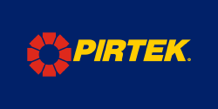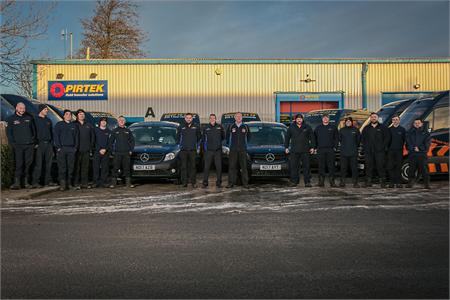Pirtek Tyne and Wear is expanding its business: Its Total Hydraulics Management extends Pirtek’s existing Total Hose Management model, which involves labelling, cataloguing and systematically servicing hydraulic hoses, resulting in fewer accidents and less downtime. On large machinery and big contracts this investment saves money in the longer run for Pirtek customers.
Hoses are just one part of any hydraulic system and it makes sense for an operator to use the same company to service the entire setup. Streamlining business operations is efficient in itself, but more importantly, integrating hose servicing with the management and maintenance of the whole hydraulic system means all the knowledge and data is held in one place and accessible to expert engineers for review.
Driving forces
The roots of Total Hydraulic Management lie in when Pirtek Tyne and Wear needed to expand its service offering.
“For a business like us, running 10 hose vans, to build up more business when you’re already big player in a market, is quite difficult. Hydraulics opens up a totally new avenue for us,” Kevin explains.
“Our core business has always been on-site replacement of hydraulic hoses – a small component of hydraulics systems.
“A couple of years ago, Brian Abraham, our sales manager asked if we could start going into hydraulics. To be involved in hydraulics you have to have a lot more training, a lot more industry knowledge; in short – it’s not as simple as hoses.
“I said to Brian ‘Go out, have a look around, see what’s there, see what we could make of this,’ knowing that in the background we had the Total Hose Management system.”
Total Hose
Management provided the conceptual basis for the systematic maintenance of hydraulic systems and was something that Pirtek Tyne and Wear had been doing for local family-run mining company, Banks Mining for around three years.
Moving into hydraulics has enabled Pirtek Tyne and Wear to pick up further business.
Kevin says, “Brian went out and spoke to several customers and we gained several accounts quite quickly. Some customers had issues with hydraulics systems. We’ve got a couple of guys working for us who are really good on the hydraulics, so we went in, diagnosed the fault, repaired it and as a result picked up the hose work.
“Most of the work that we weren’t getting is now coming our way because we’re getting involved in the hydraulic sector.”
Data
Like Total Hose Management, Total Hydraulic Management is fundamentally a data-based system, in the latter case, coordinated by a piece of software called Total Asset Management. Kevin hopes that every one of his engineers around the country will have access to this programme within 12 months.
Parts and maintenance are catalogued and the information made available to customers and engineers, allowing components’ end-of-life to be managed in an orderly manner, preventing accidents, reducing downtime and eliminating the environmental damage caused by hydraulic oil leakages.
“We attach a tag to a piece of equipment, which could be traceable by RFID (Radio Frequency Identification), barcodes or unique asset identification number. Then we enter it into the system, which has a customer portal, allowing customers to go in and look at the reports we do.
“This builds up a massive amount of data that a lot of companies simply do not have access to. We can enter into service contracts a commitment to look after the hydraulic systems, but also to give reports so companies can download and look at the performance of each piece of equipment within their operations.
“We’ve spoken to several and none of them had a clue. It’s a massive opportunity.”
Taking a holistic approach to managing hydraulic systems has further benefits in diagnosing and rectifying faults.
“If a hose has been replaced three times in 12 months, it’s obviously not the hose that’s failing,” Kevin says, “there’s something wrong elsewhere.
“For a lot of companies at the moment, if the hose fails, they get another one, the hose fails, they get another one and so on. The root cause is never addressed.”
One of the diagnostic tools utilised in Total Hydraulic Management is the oil contamination report.
“We take a sample of oil and do a report within 24 hours, giving a breakdown of every single contaminant in the oil – chrome, other metals, everything. Then you have an indication of what is causing a problem.
“You can only do that if you do regular maintenance – preventative maintenance. That’s Total Hydraulic Management.”
Software
“Once we get our data management combined into a bespoke software system, we will be able to pull down the asset number of any machine and tell the customer how many times the machine has failed because of a hydraulic fault,” Kevin says.
“In the back of the software will be the asset management system. Every hose we then supply will be logged on the software, which the customer will have a portal to and all existing Total Hose Management data will be exported from Excel to the new software so we will have that historical record to refer to.
“We will be doing something that nobody else does. They may do it on elements such as engines, gearboxes or transmission, which cost hundreds of thousands of pounds. Hoses are minuscule in comparison, but if we can start collecting the data, people will begin to appreciate the knock-on effects in terms of time, labour, oil, environmental costs.”
Banks Mining
The Tyne and Wear franchise has been doing Total Hose Management for north-east mining company, Banks Mining (www.banksgroup.co.uk/mining) for around three years.
Robbie Bentham, plant director at Banks Mining sees it as an investment. “From where we were previously, reacting to breakdowns, we analysed the nature of the breakdowns and concluded we needed to start addressing hoses on a more proactive basis.
“We see the value in improving the availability and reducing the downtime of the assets, particularly on the large rigid trucks and the prime movers, because if one of those assets is down then production comes to a grinding halt – that has a huge impact on production efficiency
“If we had a hose burst, we would have to call Pirtek out, therefore we suffer a delay in production and associated cost. We’d have an asset stood idle and we’d be introducing contamination into the system and risk subsequent expensive premature component failures.
“We spend a lot of money on lubricants, so we’re tracking that cost against spend on hydraulic hoses and we do see a correlation. By investing in hoses you fundamentally reduce your spending on hydraulic oil as well.”
Predictability is a key attraction of Total Hydraulic Management. “We don’t like to live in an unplanned, unpredictable world,” says Robbie.
We target ourselves in line with world class maintenance standards at 80 per cent of maintenance planned. Planned servicing, brake testing, component replacement, preservice inspection. On average 80 per cent of every activity performed on an asset is planned and controlled. Once you move into a world of being unplanned your cost escalates.
“With Total Hydraulic Management, we can take the asset down when it’s convenient to the business. There is a real benefit to that.”
Trust rewarded
Explaining the regular maintenance process, Robbie continues, “Prior to a planned service event we produce and share with Pirtek an asset inspection schedule. This allows the hose engineer to inspect the hoses on the relevant assets and produce a report with recommendations to replace or address potential hose related issues. I don’t think we have ever turned round to them and said, ‘We’re not going to change those hoses based on your recommendation,’ because we see these guys as the experts. Additionally, Pirtek have rerouted existing hoses to prevent further rubbing and chaffing thus increasing the life of the hose in current operation. This clearly demonstrates added value beyond being just a hose supplier.
“It’s money well spent – we’ve been tracking the effectiveness of that strategy and our figures confirm that it works.”
In January 2016, 34 per cent of maintenance jobs were unplanned or emergency intervention, with only 66 per cent performed as part of a planned and scheduled event. During 2017, this ratio significantly improved, averaging 82 per cent planned and 18 per cent unplanned across the year. Monthly unplanned figures were frequently in single figures, going as low as five per cent in February of that year and six per cent in September 2017.
“Our department works to a target to provide 98 per cent availability on the prime movers fleet, which is challenging but achievable through our maintenance strategy and continuous improvement philosophy,” says Robbie.
Kevin backs this up, saying, “The number of opportunities for a machine to stop working is enormous so to achieve that percentage is phenomenal.”
All this data goes a long way in selling the benefits of proactive maintenance. It was Robbie Bentham who first saw the benefits at Banks Mining, but initially he a point to prove.
Kevin says, “You have to persuade the maintenance team that you need to spend money on a hose that on the face of it looks ok.”
Andy Palmer, Banks Mining plant maintenance supervisor was initially one such sceptic.
Andy says, “At first I thought it would not save much time or money. But the proof of the pudding has been in the eating; it has helped us operate more safely, responsibly and efficiently – which is what Banks is all about. It also fits very much into our development with care approach, whereby all we do is done with care for our team mates, subcontractors; neighbours and the environment.”
Kevin is happy to say that Pirtek has won over the doubters, primarily due to its reports proving the concepts. “You can talk about it until you’re blue in the face but unless you’ve got something tangible to show, it’s all just words.”
Now Banks Mining engineers can see the proof in the data. Proactive maintenance makes their life easier.
Robbie agrees, “Through analysis of the fleet we identified a problematic asset and decided to perform a ‘controlled take down’ by aligning planned and backlog work with addressing areas in need of attention. This resulted in a major rebuild on a Caterpillar 785 dump truck with Pirtek supporting the initiative by replacing all the hoses across the entire truck. This concept, with additional support from Pirtek, has proven successful with mechanical availability and mean time between stoppages now back to an acceptable level. Obviously, this type of event is costly but it’s demonstrably worth it.”
On site
According to Kevin, Pirtek is fully equipped and has a permanent staff presence at Banks’ Shotton mine. “We have what is equivalent to one of our depots, allowing us to work within the 0.2mm standard and we’ve got about £30,000 of stock on site.
“We upped the stock on the real fast moving stuff. We carry 20 metre coils of hoses of every size at Banks’ site, so we should never be caught out unless there are multiple unplanned jobs in one day. The object of the system is obviously to reduce these – something we’ve been very successful in doing.”
With Pirtek’s engineers permanently stationed at the Shotton mine, the working relationship is very close, says Robbie. “Pirtek’s guy on site is considered a member of Banks’ team. We don’t treat him any differently. He’s one of the guys.”
Environment
Robbie says, “On components worth hundreds of thousands of pounds, if you don’t change the hydraulic hose, that hose could burst and then run the machine dry. On something like a 500 tonne RH200 excavator, you could lose thousands of litres of oil if a hose fails.”
This ties in with Banks’ commitment to the environment, as Robbie explains.
“We recognise the impact on the environment if a hose bursts so we work proactively to avoid that. We have a very clear, auditable route for hose disposals – any hose that comes off gets into a waste management system run by Pirtek. Everything coming off site is tracked and traceable.”
Giving Pirtek’s point of view, Kevin says, “We are registered with the Environment Agency for disposal. We dispose of all of Banks Mining’s hoses and give them the certification so that they can prove that they’re following the environmental guidelines they should be.”
Increased efficiency also reduces transport related emissions. “With monthly unplanned maintenance down from around 80 per cent of jobs to being in single figures, stock control is rationalised and this has a massive environmental impact,” says Robbie.
As for the final impact of mining on the local environment, Banks Mining is second to none its reclamation schemes, Kevin says. “The way it leaves the site is totally different from the companies of old. Banks digs a mine and supports local communities with jobs and when it fills in the hole, it leaves something such as a wildlife park, walks, upgraded roads, etc. The company is passionate about how it leaves the site.”
In a marketplace that Pirtek already dominates leaving fewer opportunities for expansion, Total Hydraulic Management offers franchises the chance to increase their range of activities. Having a more comprehensive knowledge of a customer’s hydraulic systems means the client has a further incentive to stick with Pirtek, particularly given the demonstrable results achieved by planned maintenance.
Pirtek’s professionalism gives customers the confidence to delegate decisions about replacement of components and this faith has been seen both at management and maintenance team level. A further advantage is the safer and more efficient management of components, which results in fewer hydraulic spillages, providing both environmental and economic benefits.
A broader skill set for Pirtek’s engineers may also be seen as an incentive for them to continue developing their careers at the company.
Kevin concurs, “It’s all about verifiable data that demonstrates to management that it’s worth the investment and brings those on the shop floor on board. And there’s not many companies that can give you that data.”
In a data driven age, Total Hydraulic Management is the way forward and this is something that Pirtek Tyne and Wear and their customer Banks Mining are convinced of.
As Robbie says, “We make decisions based on data not emotion. Sometimes you’ve got to produce some data to get past the emotion.”






Select a country